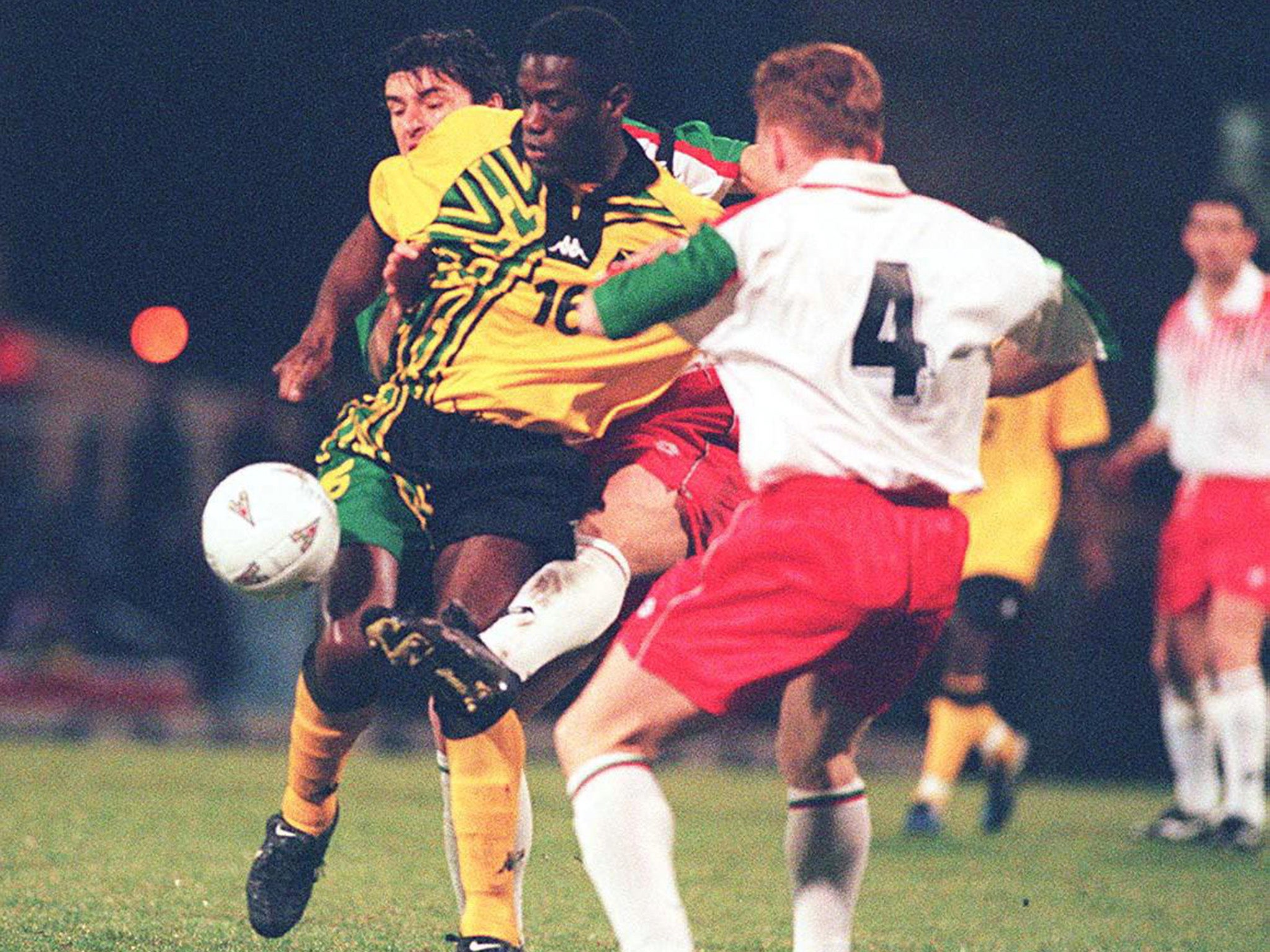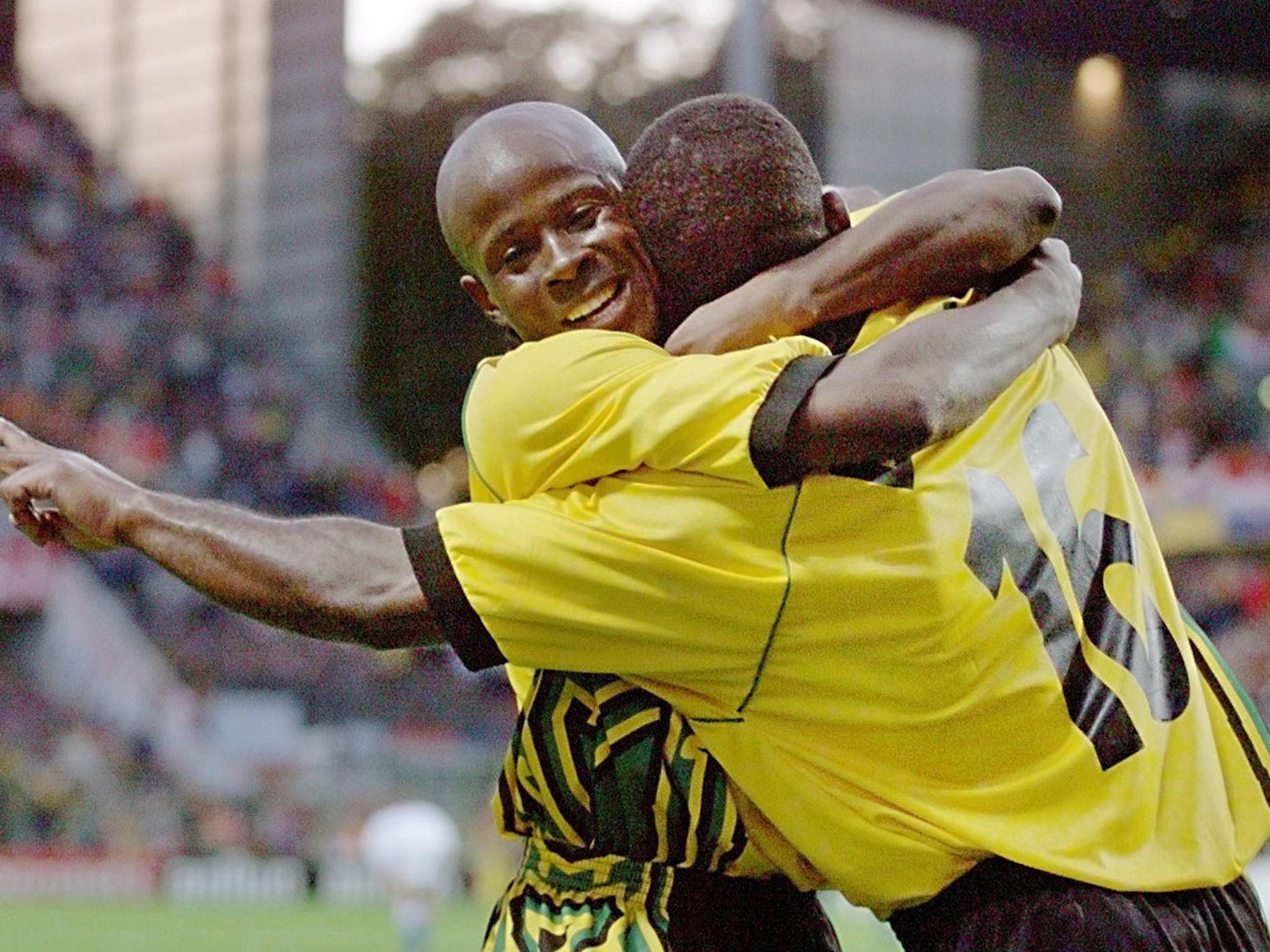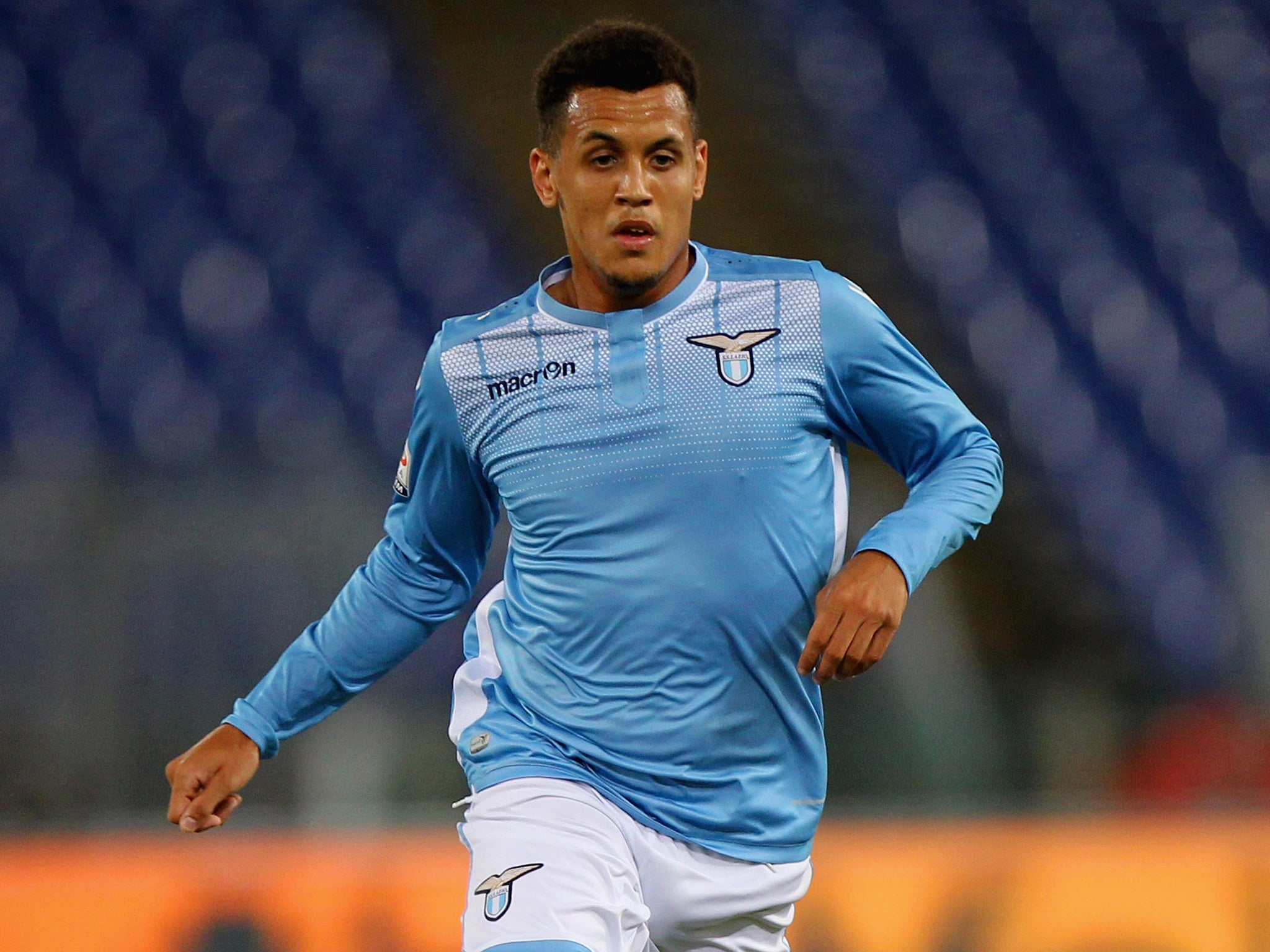World Cup 2018: How history-making Jamaica became more than just the ‘Reggae Boyz’ at France 1998
Iceland are making their first-ever appearance at a World Cup this summer. Twenty years ago, it was Jamaica's turn to write themselves into the history books, as told by ex-player Robbie Earle

Your support helps us to tell the story
From reproductive rights to climate change to Big Tech, The Independent is on the ground when the story is developing. Whether it's investigating the financials of Elon Musk's pro-Trump PAC or producing our latest documentary, 'The A Word', which shines a light on the American women fighting for reproductive rights, we know how important it is to parse out the facts from the messaging.
At such a critical moment in US history, we need reporters on the ground. Your donation allows us to keep sending journalists to speak to both sides of the story.
The Independent is trusted by Americans across the entire political spectrum. And unlike many other quality news outlets, we choose not to lock Americans out of our reporting and analysis with paywalls. We believe quality journalism should be available to everyone, paid for by those who can afford it.
Your support makes all the difference.It was the summer of 1997 when Robbie Earle accepted that a senior England call-up was never going to come.
There had been some whispers that he and Wimbledon team-mate Chris Perry would be included in Glenn Hoddle’s squad for Le Tournoi, the pair having played instrumental roles in the club securing a top-eight Premier League finish and reaching the semi-finals of both cup competitions.
But, it never happened and Hoddle went with the likes of John Scales and Lee Clark instead.
Still, for Earle, who was 32 at the time, it proved a sliding doors moment and led to him being a crucial part of a historical World Cup experience.
“I had been put on some kind of standby list, which basically meant that the kit-man had to fall down for you to get called up,” he says.
“At that point I realised it wasn’t going to happen with me and England, especially at that stage of my career. And then it was one of those things – right place, right time. I got a call from the Jamaican Football Federation and they’d got through the first couple of rounds of their World Cup qualifiers. In the previous 12 months, while the England thing was bubbling and it was getting a bit of press, there was some contact between the JFF and my agent. Just checking about my parents and whether I was eligible and, if I was, would I like to come in. And it was always something I said I’d be open-minded about.
“I’d got a sense of what was happening and how professional the set-up was and how serious they were about making it to the tournament and I was very quickly on board.”
The Jamaicans were chasing a very first World Cup appearance. But, when it mattered most, the wheels had come off. In their final round of qualifiers, they were winless after four games. Things badly needed refreshing. So, the top-brass got creative with their thinking.
Earle wasn’t the only English-based player they contacted.
Portsmouth duo Fitzroy Simpson and Paul Hall, as well as Derby’s Deon Burton were canvassed too. And when they faced Canada in a crucial clash in Kingston in September 1997, all four were part of the Jamaican squad.

Burton popped up with the winner, did the same against Costa Rica a week later and scored against the United States the following month. Later still, he was voted Jamica’s sports personality of the year.
Qualification was secured after a scoreless draw with Mexico and the inevitable carnival followed.
“The day after was declared a national holiday – trust Jamaica,” Earle says.
“We all went to a reception with the Prime Minister and were told that every player was being awarded a piece of land – to build a house on or whatever – as a thank you from the country for what we’d achieved. It was remarkable, really. Off the back of it tourism went up ten-fold. Crime rates dropped across the country. It was just one of those things that everybody wanted to be part of.”
Earle didn’t feel any apprehension or regret in pulling on a strange jersey and standing for a strange anthem. For him, it made sense. It was his background and a substantial part of who he was.

“In many ways, it was more for my parents than me,” he says. “It was a country they’d grown up in. They’d left in their very early 30s to move to the UK and give their kids a better education. So there was a lot of sacrifice from them. It certainly meant as much – if not more – to them as it did to me, considering what they’d gone through. But it still meant a lot to me. It was one of the most satisfying things I ever did in my career.”
The issue of identity was a continuous subplot, though. Despite the team having unified the country, there were rumblings that the new arrivals had divided the squad. Well-paid, high-profile professionals on one side. Easy-going unknowns on the other. It added another layer to the entire debate. A Channel 4 documentary was aired just before the Jamaicans’ opening World Cup game against Croatia and poured petrol on the fire. The English-based players drove fancy cars and wore designer clothes. The other squad members did not.
Last year, Rene Simoes – who was in charge of the side in France – said the programme ‘destroyed the harmony’ in the group.
But Earle disagrees. “One or two people tried to suggest there could be a divide between the English-based players and those based in Jamaica but nothing was further from the truth.

“To be honest, some of the guys who played in Jamaica were more professional than some pros I played with and who were getting paid thousands of pounds per week. The camp was very different. Basically, it was a glorified club team but in the guise of a national team. We all lived together. We trained every day. We played lots of friendlies and were always flying around to different countries. It was a day-to-day activity. International football usually gets you all together for a week and then you’re off again.”
By the start of the tournament, there were seven British-born members of the Jamaican squad. Earle’s Wimbledon team-mate Marcus Gayle was added to the mix, along with Chelsea’s Frank Sinclair and another Derby player in Darryl Powell.
Five of them started against the Croatians and Earle ensured his immortality by grabbing the very first Jamaican goal at a World Cup in what ended up being a 3-1 defeat.
Despite the loss, there was a vibrancy and curiosity about the team. Neutrals quickly flocked to them and they were media darlings. But Earle was irritated by how much the ‘Reggae Boyz’ tag was used and felt it gave the wrong impression.
“It definitely was a term of endearment and I think there was an element of the Cool Runnings thing about it.
“But I thought it was slightly disrespectful. To be representing Jamaica on the world stage, I thought at times that it was a bit glib and bandied around a bit too much. Almost like a nickname. The Jamaican National Team, that’s who we were. Whether we, or the Jamaican fans, wanted to call ourselves the Reggae Boyz was another thing. But I didn’t like that everybody else was jumping on it. It was almost like we were figures of fun at times.”
With the exception of a 5-0 thumping at the hands of a Gabriel Batistuta and Ariel Ortega-inspired Argentina, the Jamaicans were no punchline. Even against the South Americans, they were in contention until Powell was sent-off and they were forced to play the second-half with 10 men. A 2-1 win over Japan in their final Group H game proved just how competitive they were and ensured they finished with a flourish.
“The first game was really the key,” Earle says.
“If we’d nicked a draw and stayed in touch, you never know. But there were so many better players and better athletes in that group. Players who were well-coached and well-developed. And they went on to have great careers in England, the US, Scandinavia. So Jamaica became a place where people started to look at football talent because there had been players who went onto the world stage and impressed.

“Jamaica is a very small country yet it seems to make a mark. We’ve seen that subsequently with Usain Bolt and the cricketers too. And in 1998 it was the football. It took a grip of the country and it was Jamaica getting to be proud of itself.
“Joining in with the squad, managing to qualify, getting the first goal at the World Cup, establishing Jamaica a little bit on the football map...It’s certainly up there with the most important things I’ve done in my career.”
With Ravel Morrison revealing last month that he’s set to declare for Jamaica, Earle – who’s now a Premier League TV analyst with NBC in the US – thinks more English players should weigh up the possibility of representing a different country.
“It’s a great chance to go and play international football and to be recognised at that level.
“There are only 23 places in a World Cup squad for English players so if you have dual-nationality or you’ve got Caribbean parents or whatever, it’s something players should look at. I can certainly vouch for how good an experience Jamaica was for me as a player. We played in different systems, in different climates. I was a better player having gone through that whole World Cup experience – the qualification, traveling to difficult places and having to endure some hostile environments. It ended up helping me and my career. And it matured me as a person too.”
Join our commenting forum
Join thought-provoking conversations, follow other Independent readers and see their replies
Comments